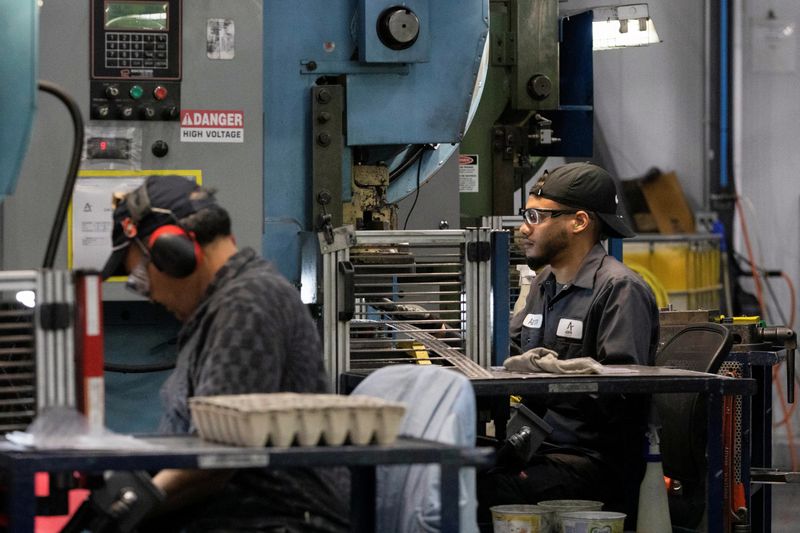Canadian firms see labor market pressure easing, near-term inflation slowing
2023.06.30 10:43

© Reuters. FILE PHOTO: Factory workers operate machine presses at Abipa Canada in Boisbriand, Quebec, Canada May 10, 2023. REUTERS/Evan Buhler/File Photo
By Steve Scherer
OTTAWA – Canadian businesses see labor pressures easing and expect short-term inflation to edge down, the Bank of Canada said on Friday in a second quarter survey, but fewer firms expect an outright recession over the next year than three months ago.
While more businesses still expect to hire over the next year, the survey showed the number to be lower than the first quarter and about half of what it was a year ago, and those still seeking to hire expect the labor shortage to be less intense.
More businesses still expect wage growth over the next year, but the second-quarter number is a third of what it was a year ago. An increasing number of firms see both their input costs and the prices of what they sell declining over the next year.
“Although labor shortages remain common in some sectors, pressures on the labor market are easing due to decreased competition for workers and increased labor supply,” the report said. “Firms expect growth in their wages to moderate from high levels.”
The second-quarter survey is mostly good news for the Bank of Canada (BoC), as the trends point toward slower sales growth and more moderate wage growth. After a five-month pause, the BoC raised rates to a 22-year high of 4.75% earlier this month.
After the latest increase in borrowing costs, the BoC said monetary policy was not sufficiently restrictive, and most analysts and money markets expect another 25-basis-point hike either next month or in September.
The BoC has said that going forward it will look to economic reports like the business survey to determine whether more hikes are needed. Ahead of this month’s hike, first-quarter GDP rose 3.1% – versus the central bank’s 2.3% forecast – driven in part by consumer spending.
While the overall survey paints a picture of businesses expecting growth to gradually cool, only a third of businesses expect a recession over the next year, compared to half of those surveyed in the first quarter.
Furthermore, more firms now think it will take five years or more for inflation to return to close to the BoC’s 2% target than in the first quarter.
According to a separate survey of consumers, expectations for inflation for the next year eased to 5.09% in the second quarter from 6.03% in the previous quarter.
“Although half of respondents still expect a recession in the coming year, consumers’ confidence about the future of the economy has improved as their inflation expectations have lowered,” the consumer survey said.








